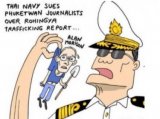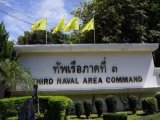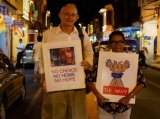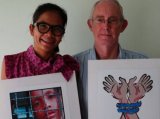|
|
Thailand: Drop Charges, Says Rights Group
By Human Rights Watch media release Friday, April 17, 2015
NEW YORK: Thai authorities should drop criminal proceedings against two journalists for reporting on trafficking of ethnic Rohingya ''boat people,'' Human Rights Watch said today.
Alan Morison and Chutima Sidasathian, the editor and correspondent of the news website Phuketwan, were charged one year ago, on April 17, 2014, with criminal defamation and the Computer Crimes Act based on a complaint filed by the Thai navy.
If convicted on the criminal defamation charges, Morison and Sidasathian could be imprisoned for up to two years. Under the Computer Crime Act, they face a maximum sentence of five years in prison and a fine of up to 100,000 baht (US$3,125). They are scheduled to go to trial on July 14-16.
''The Thai authorities should direct the navy to unconditionally drop its baseless charges against the two journalists,'' said Brad Adams, Asia director at Human Rights Watch.
''This effort to silence media criticism has backfired against the navy, which should act swiftly to cut its losses.''
The charges centered on a paragraph in the Phuketwan online newspaper on July 17, 2013, that cited a Reuters investigative report alleging that some navy officials ''work systematically with smugglers to profit from the surge in fleeing Rohingya,'' and that they earn about 2000 baht (US$63) per Rohingya ''For spotting a boat or turning a blind eye.''
The report was part of a Reuters investigative series on the plight of the Rohingya, an oppressed Muslim minority in Burma, that won a Pulitzer Prize.
Human Rights Watch believes that criminal defamation laws should be abolished, as criminal penalties are always disproportionate punishments for reputational harm and infringe on free expression.
Criminal defamation laws are open to easy abuse, resulting in very harsh consequences, including imprisonment. As repeal of criminal defamation laws in an increasing number of countries shows, such laws are not necessary for the purpose of protecting reputations.
The International Covenant on Civil and Political Rights, which Thailand has ratified, guarantees the right to freedom of expression, which includes the right to impart information.
The United Nations Human Rights Committee, which monitors state compliance with the covenant, has expressed its concern at the misuse of defamation laws to criminalize freedom of expression and has said that such laws should never be used when expression is without malice and in the public interest.
''The Phuketwan journalists are among the few who are still regularly reporting on the pervasive human trafficking of Rohingya in Thailand,'' Adams said.
''Thailand's efforts to show progress in tackling human trafficking are seriously damaged by this shoot-the-messenger action against journalists exposing abuses.''
|
Comments
Comments have been disabled for this article.

Dear Editor
I can never escape the great irony concerning the way criminal defamation laws are misused in Thailand in attempts to silence human rights defenders.
It is often said, perfectly correctly, that within Thailand foreigners and Thai citizens are subject to Thai law and are expected to abide by the law.
In contrast, the authorities and organisations that commence these criminal actions against human rights defenders can be said to be breaching Thai laws such as those relating to slavery, human trafficking or abuse of migrant workers.
In addition, it is often evident that there is an abuse of the legal process in the use of criminal defamation laws where the "plaintiff" is aware that statements made by human rights defenders are true and made in the public interest.
It was great to see the British activist, Andy Hall successfully defend the first criminal defamation case against him. It was also great to learn that the case against the anti-torture advocate, Khun Pornpen Kongkachornkiet was dropped earlier this year.
One can only hope that the Navy drops its cases against the two of you.
Ian Yarwood
Solicitor - Perth, Western Australia
Posted by
Ian Yarwood
on
April 17, 2015 08:34

Ian,
Have you ever been to Thailand? I don't mean the facade we all experience in tourist destinations but the way the majority of poor rural people live.
The current action against PW is typical of where positions of power are used against the poor who are unable to defend themselves.
Fair and equatable justice does not exist within the Thai legal system. What does exist is similar to NSW in the 70's, now often referred to as the best police force money could buy.
Unlike us in Australia, where the vulnerable or those who cannot afford representation will be provided with legal assistance, access to such is either limited or not provided at all.
We are lucky in comparison through both legal aid and/or advice provided pro bono.
In Thailand money talks and those without learn to keep quiet or suffer the consequences from those who have. There is an acceptance that money is power and that power and connections allow you 'benefits' that the poor do not experience. Some may even say not worthy of.
I also understand there will be many who disagree but having experienced a family member murdered by the hand of a local influential businessman, I witnessed the reluctance to report true details of the incident and where authorities take no action because they fear the power such people have.
This failure of the justice system creates only a more powerful person and greater reluctance to cross paths or create any type of conflict.
Any reasonable person believes that those who commit crime should be punished but we don't see any consistency in enforcement of crimes across the whole spectrum of the population.
What we do experience is that the poor or those unable to fund a case are punished and those who are wealthy, being able to drag any case through various appeal processes, sometimes for 10 or more years. In the end its either forgotten about or compensation makes the case disappear.
I, like I'm sure the majority, initially had concerns that this was allowed to occur. I believe that criminal cases should be prosecuted and following on from the success, a civil claim for damages should be a natural course of action.
Unfortunately, in Thailand this is not always the way it works. Adequate compensation paid to any victim appears to remove or bypass the need for many criminal trials.
Is this wrong? For many years I thought about it and I still often do. I can also see the other side and while I don't agree with it, it does provide, in some cases, the best possible financial situation in regards to the loss they have suffered.
Posted by
Manowar
on
April 17, 2015 14:19

Manowar: You just proved why foreigners must look through the cultural lens of Thailand to understand how it ticks, and even then we still aren't certain.
It implies you have to spend much time in the Kingdom, but smart people like Ian will infer the basics of the "reality," I mean perception over time. The blanks may never be filled in..
Posted by
farang888
on
April 17, 2015 23:05

F888,
If I had written down my experiences and opinions from my first trip to Thailand and compared that to what I know now, the comparison of both by any reader would assume two different countries. In saying that, the latter would, on some issues, be an improvement.
One of the faults of the human brain is that it receives information from all the senses, then interprets that information to provide a best fit situation based on previous experiences.
What a person sees is not always what occurred and two people witnessing the same event may have two completely different opinions.
In comparison to what I know now, many westerners live in a 'cacoon' and I include myself in this group. We believe that the way the world works at home is the right way and the way all countries should function.
If we consider the simple question of why do people travel to other countries for a holiday no one would suggest for the purpose of experiencing the same environment as back home. Most will travel to experience different cultures, so what really is a country's culture?
Surely the only description of culture would be the way a country functions, the way people relate and respect each other, the food they eat and how it is prepared and the list could go on.. but would basically be the everyday normal events of that society.
What is presented to outsiders in order to attract them to visit and what really occurs are two completely different situations. Unless you remove yourself fully from this facade you will never see a country for what it is.
Take Australia as a perfect example. Tourism advertisements will show a Sydney Harbour Bridge walk, a visit to the Opera House, maybe and afternoon at the footy and then we will watch a sunset over Ayres Rock. I haven't done most of these and have no desire to so why are they apparently attractive to tourists?
The same applies to Thailand with nice beaches, food, Temples and all provided with a friendly smile.
What are we looking for and why do we need a holiday?
The answer will be different depending on the person but in reality the true answer is the same.
We are looking for a change in environment away from the routine of normal life but not too different where we have to do without normal luxuries.
'Luxuries' then becomes an interesting topic because are we talking about necessities or are we referring to waste and excesses that are our normal life.
So we visit a country such as Thailand and we fail to understand why crime goes unpunished, why people drive unlicensed, why the elite or wealthy seem to benefit at the expense of the poor and why is this allowed to continue.
The answer is survival. The poor need to do whatever is necessary to feed their families and the wealthy need to do whatever is necessarily to feed theirs at the levels they are familiar with. The family structure difference between the wealthy and the poor is also different. The wealthy live similar to western societies and the poor have, what I call ' a reverse wealth' system whereby a child is financially responsible for the upkeep of aging parents which creates an endless cycle of poverty for the majority.
The answer is a simple aged pension system for support but the cost to implement will be a huge burden on Thai finances. The middle class will argue as to why should such a system be introduced when most of these people have not contributed by way of taxes during their whole working life. Another argument would be introducing such a system will improve the quality of life of many people, increasing the demanded rate of pay, therefore creating additional labour costs for our business. We basically get hit with the cost twice.
The reality is, you don't meet too many people willing to sacrifice their own quality of life for the benefit of others. It is mainly someone else's problem.
So people learn to survive by whatever means necessary and accepted by society to maintain the social level they are familiar with.
Westerners talk about superannuation, life insurance and holiday funds while the poor look at what money is available to buy food for my family tonight and if lucky, tomorrow. There is no retirement pension, the good life after 65, the holiday abroad, the holiday house down by the beach or golf twice a week.
There is just an endless cycle of struggling to survive by whatever means available and I doubt anybody who faced with the choice of returning home with no money to feed a hungry family or being involved in a minor crime or corrupt payment then being able to feed their family, would be able to continually resist these temptations which appear to be socially accepted.
Posted by
Manowar
on
April 18, 2015 06:41

The Andrew Drummond site might have been blocked by the government. It was working yesterday, but attempts to access it this morning result in a Ministry notice. Hoping that this is only a temporary glitch, but it certainly appears ominous.
Posted by
Treelover
on
April 18, 2015 07:58

@Treelover: Indeed it is blocked. If you want access, use a free VPN such as ZenMate to get round the block.
Posted by
Pete
on
April 18, 2015 09:54

@ Treelover you are right, I also got a 203.113.26.210 screen. Use one of the many many vpn's and you will get into anything.
BTW does the ministry not realise that most of the people who do read Andrew Drummond, do so from outside of Thailand?
So what is the point of blocking it here???
Posted by
Duncan B
on
April 18, 2015 12:35
Editor Comment:
It really is odd and it requires some kind of explanation from the government. I hope the British Ambassador is also concerned.

Hi Manowar:
I can imagine that there would be many expats familiar with the way things work in Thailand who would be nodding their heads in agreement as they read your comments contained in both of your letters that appear above. Readers less familiar with Thailand would certainly be able to learn a few things from your contributions.
I have never experienced the tragedy of a close family member being murdered in Thailand or anywhere else. I have however read stories similar to yours.
To answer the question you posed to me: Yes, I have spent a great deal of time in Thailand over the past 20 years. Yes, I have stayed in some poorer regions living with a couple of hilltribe villages near Chiang Rai for brief periods and I have stayed in many places in Isaan (in the North East - by the way .. for the benefit of Non- Australian readers I will mention that your reference to the acronym ''NSW'' meant New South Wales which is a State within Australia and the home of the Sydney Opera House.). I have a modest command of the Thai language and can read and write just a little in the Thai script.
I have poor Thai friends and I have wealthy and very highly educated Thai friends. I have had the benefit of learning a great deal from all of them and I have had the benefit of learning from expats such as yourself. I was born in South-East Asia and have travelled extensively in the region and even spent time in: a refugee camp inside the Thai/Burma border; a minefield in Cambodia; and courts in Bangkok. Like most readers in this forum I am well aware that in Thailand as in most Asian countries there is huge emphasis on ''face''.
One of the main points you were making in your first letter is that powerful people in Thailand typically misuse the law and the system against Thais who are less powerful. I agree completely with your observation. Indeed, on a previous occasion on the Phuketwan site I made this very point. Furthermore, in the letter I wrote yesterday I mentioned the names of two Thai activists, Khun Chutima Sidasathian and Khun Pornpen Kongkachornkiet (of the Cross Cultural Foundation) who are and have been on the receiving end of criminal defamation charges.
Abraham Lincoln once said: ''Nearly all men can stand adversity, but if you want to test a man's character, give him power.''
The character of many powerful interests is being tested at present. The current legal actions against Alan and Khun Chutima hurt them and hurt the Navy, which is most unfortunate as these two fine reporters have generally had a very good relationship with the Navy. One can only hope that the Navy comes to the decision that the appropriate and the most honourable course to take is to unconditionally drop the charges.
In the West, as you would know, a solid aspect of the culture is that ''one should not shoot the messenger.'' The case against Phuketwan has been the focus of a great deal of international attention because of that culture. I believe that it is an aspect of Western culture that an increasing number of Thais are learning about.
Ian Yarwood
Solicitor - Perth, Western Australia
Posted by
Ian Yarwood
on
April 18, 2015 13:54

Thanks Ian,
It's always interesting to know the background of a person as it provides some insight to understand how different people consider a situation.
The unfortunate part of the issue I previously raised was that it was not considered a tragedy, it appeared to be an accepted consequence of annoying the wrong person. It did not occur in a dark alley, it was in broad daylight, in front of many witnesses and the offenders were not concerned about being identified. If anything, they wanted to be identified, casually walked in and walked away. It was a clear warning to keep your nose out of others affairs or you ( anyone who gets involved) may end up the same.
When a foreigner suffers the same, we read about it for years, authorities are pushed to find those who committed the crime but I don't think many of us realise just how often similar events occur in the local population. Unless it happens in a tourist resort area, details seem to be rarely released and they become just an event that local know did occur.
Posted by
Manowar
on
April 18, 2015 16:11

"Assume a virtue, if you have it not." William Shakespeare (1564-1616)
People of a certain culture or society have unique common customs and beliefs. They share inherent values and social paradigms that characterize and differentiate their peoples. Each culture evolves over thousands of years.
A cultural template is painfully and gradually developed, superimposed like a hard- drive into the psyche of the cultural member. Individuals share attitudes and behaviors - concomitant to the very fabric of their being. Humans in different cultures evolve in different ways, therefore have different attitudes toward situations. Western and Eastern attitudes, psychology, social patterns and philosophy are frequently polar opposites - diametrically opposed.
Consider the difference of western and eastern philosophy regarding life and death. The following is an excerpt from "Kamikaze, Japan's Suicide Gods," by Albert Axell and Hideaki Kase: "The psychology behind the Kamikaze attacks was too alien to us. Americans fight to live, but find it hard to realize that another people will fight to die. We could not believe that the Japanese, for all their hara-kiri tradition, could muster enough recruits to make such a suicide corps really effective. We were violently disillusioned the very next day (October 29, 1944), when they missed the carrier Enterprise, but hit two other carriers, Franklin and Belleau Wood." (Admiral William F. "Bull" Halsay, American Navy)
The American Navy and Air Force could do little against determined Japanese suicide bombers. Lieutenant Commander Tom Blackburn, USN, who shot down eleven Japanese planes commented that, "The most effective thing against the Kamikazes was that they finally ran out of pilots." Axell, Albert. Kase, Hideaki. "Kamikaze, Japan's Suicide Gods." Longman, 2002.
For a person of sound mind, to die voluntarily in the prime of life seems absurd, yet most Kamikaze bombers were of sound mind. They were operating under a different paradigm.
People in Western and Thai culture generally operate under a different set of norms - rendering the cultures diametrically opposed to each other. For example westerners hate being late, while Thais are much more laid back regarding timelines. People are molded and shaped by their respective societies. Unique and deeply held views of a given culture become so innate - that individuals are not overtly conscious of their own instinctual and behavioral tendencies.
Westerners and Thais employ different ways to communicate complex social imperatives. For the unaware, the culture - contrast results in a culture - clash of terrible proportions.
Cultural differences are at the very core of how Westerners and Thais interpret and perceive various data.
One time I asked a Thai woman when her father had quit working. She replied, "when he couldn't work anymore." I was expecting her tell me what year or how old he was when he quit working. That was my western culture talking.
Another time I asked a Thai acquaintance where they worked. I expected to hear what type of work they did. Instead, they gave me their employment address and street.The Thais answered correctly in both cases - but as a farang my perception of how they would respond was wrong in both cases. As these trivial examples show, Thai and western brains are culturally wired much differently.
The two cultures share values in degree - it's a question of which value wields the most influence in making individuals act or respond as they do. When western people attempt to impose their cultural attitudes, bias and values on Thai people, the attempt is almost always unsuccessful.
It's like trying to give ice to Eskimos. They certainly don't need it. Like every culture, Thai culture has been developed and evolved across time and distance - and as a visitor to their country, the proactive foreigner should adapt accordingly. When living in Thailand, those foreigners that cannot change deeply-ingrained cultural attitudes can get into a lot of trouble, and some meet their demise.
Posted by
farang888
on
April 18, 2015 23:15

Hi farang888
I enjoyed reading your letter of 18 April just above.
I agree that foreigners in Thailand should adapt to Thai customs BUT only up to a point. I personally prefer to adopt the best of both cultures.
I certainly appreciate Thai charm, friendliness and hospitality. I am perfectly happy to show respect to monks. I am perfectly happy to stand in cinemas with everyone else as a display of respect to the King of Thailand. I am happy not to touch adults on the head. I am happy to refrain from pointing a foot at another person.
However, slavery is still wrong. According to the global slavery index there are 475,000 slaves in Thailand. Many Thais are very tolerant of this dreadful situation. Indeed, as you know, many poor families sell their own daughters to brothels.
Human trafficking is wrong.
Shooting the messengers who are telling the world about the trafficking of minorities through Thailand is wrong.
Attacking the little guy with criminal defamation charges is wrong. The Navy is taking action against Phuketwan journalists but not touching Reuters. The Thai Natural Fruit Company has taken on Andy Hall but has not touched Finnwatch ( backed by the Finnish government) and it has not touched Al Jazeera.
Have you noticed that no one in Thailand has laid any charges against the US State Department since it downgraded Thailand to Tier 3 on its Trafficking in Persons Report?
It is self-evident that some things in life are simply morally wrong. Slavery was wrong in Abraham Lincoln's time. It is wrong now.
There is always a danger that expats in Thailand adapt too much. Please do not lose sight of your own moral compass.
Posted by
Ian Yarwood
on
April 19, 2015 10:53

Hello Ian,
My short offering on eastern-western cultures was simplistic at best.
Neither the Thai nor the Western system is "better," as value judgments are bias and subjective (but try to tell that to many long-time, jaded Thai expats). They are both quasi, self-sustaining systems that attempt to maintain order in society, and keep people content.
Before a proactive foreigner sells their home and moves to Thailand as an expatriate, they need to understand the full picture of what they are getting into, and what they will have to let go of. In particular, they may need to check some of their Western values at the door, if they wish to survive psychologically. This too is an overgeneralisation, but a starting point of reference is sometimes useful.
In general then, a foreigner unfamiliar with Thai culture will usually have no clue what's going on in the mind of the Thai person they're dealing with, as Manowar alluded to when he first came to the Kingdom. Heck, long time expats frequently have no idea. Foreigners living in Thailand would do well to understand and possible even emulate some of Thai culture - to a point.
Although these days Thais are (superficially) becoming more western in nature by social media and exposure to tourists - don't be fooled (I know you are not). The following are some
common misconceptions that foreigners have about Thais, for general consumption:
misconception: Thais don't get angry, because it's the Land of Smiles. This perception is a deception. Be wary of making a Thai person angry. Every high season one can read about a foreigner getting killed in Thailand because they got into a fight in a bar with a Thai, or something undisciplined along those lines. Thais are among the nicest people in the world but if pushed too far, they will lose it - and you better steer well clear when they do, because there will be no stopping them.
misconception: What you see upfront with Thai people is what's happening. This is the most common misunderstanding out there. Many westerners wrongly believe that what's happening upfront with a Thai is actually what's going on - but unlike in their culture, it is rarely the case. Thailand has one of the most confusing, complicated cultures in the world, especially to an unschooled foreigner. On the surface a Thai may smile and Wai, but the actual motive good or bad is often completely missed by the foreigner. Foreigners that blunder around Thailand like a bull in a China shop will be in for a nasty shock. Much of the time, what's happening of importance is behind the scene with a Thai.
misconception: When a Thai smiles, it means they're happy. That is often a fallacy. Thai folklore indicates there are more than forty types of Thai smile, and they all mean different things. When I asked my wife how many types of Thai smile there are, she said a lot. Thais smile when they're happy, embarrassed, confused, sad, anxious, angry, to name a few. If a person plans to live in Thailand, differentiating smiles avoids mistakes, misunderstandings and potential confrontations. Thais hate confrontation - smiling is a way to avoid it. However, it doesn't mean they're happy when they smile at you, it could be just the opposite.
misconception: Most Thai women would like to marry a western man if they could. This isn't true. Most Thai women have little interest in dating a western man, particularly the type that comes to Thailand in search of a wife in the Go Go bars. Most Thai women marry Thai men. Why would they want to marry a westerner, when they'll almost certainly have problems communicating with them, and the foreigner is frequently twice their age? In any case, the percentage of Thai women that marry western men is very small.
Ian, you hit the nail on the head. Going after the United States is a different kettle of fish that bullying Phuketwan or Andy Hall. Thailand picks its fights carefully, as should we all, LOL. I would leave Al Jazeera alone as well, as I still value my big head (I wouldn't mind keeping the little one too, so I don't stray too far from my kind-hearted Thai wife..).
As you alluded to, a foreigner can successfully live in Thailand and not lose their moral compass, or "sell out" as it were, rather to (precariously) balance (on the knife edge) carefully, and get the best out of both cultures. That seems to be the best way for a Thai expat to evolve. For me, "My bpen rai khrap" has a lot of upside. One can also emulate other Thai institutions, like (the extended) family first. As a result of this cultural paradigm, we don't see the homeless in Thailand as in the west, except of course in the mega city Bangkok, where people lose their way as they do in the west.
Finally, as a farang (from Canada) who only stays in Thailand 3-4 months a year (for the last dozen years), and most of that in Phuket, I am not qualified to comment with full veracity on expat life in the Kingdom. Seasoned expats tell me that all the time. It must be so.
Posted by
farang888
on
April 20, 2015 00:42

Hi falang888:
Yes, going after the United States is completely different to trying to bully Phuketwan or Andy Hall.
There is an excellent account of Andy Hall???s first criminal defamation trial. It was written by the Brisbane (Australian) barrister, Mark Plunkett and was published by the International Centre for Trade Union rights. If you google ''Mark Plunkett ICTUR'' you will be able find it easily on the net.
One of the many very interesting observations that Mark Plunkett made was that the prosecutor and the Natural Fruit Company made an issue of a broadcast by Al Jazeera, which had nothing to do with any action taken by the ''defendant/accused'', Andy Hall. The wrong party was on trial but Al Jazeera of course is more influential than Andy Hall. It seems very clear though that both Andy Hall and Al Jazeera had complete defences to any charges.
Andy Hall is in court in Bangkok today (20 April 2015) for another preliminary hearing of the more serious of the two criminal defamation charges against him. In the previous hearings (according to Andy) the focus was on the publication of a report by Finnwatch. The NGO Finnwatch was the publisher of the report ''Cheap has a High Price'' - not Andy. Andy is not even an employee of Finnwatch. Andy merely conducted some of the research used in the report. Finnwatch, as you would be aware, is funded by the Finnish government, so although not as influential as the USA it is also too big a target.
Getting back to the predicament of Phuketwan, Alan Morison and Khun Chutima it may well be the case that the mid-ranking naval officer who decided to charge them (and not Reuters) possibly underestimated the international reaction. The accused have attracted a great deal of support and the charges had simply focused more international attention on their stories of human trafficking through Thai waters.
One of the great ironies of defamation actions is that they often backfire very badly against the ''plaintiff''. An excellent illustration comes from the actions of Oscar Wilde a century ago. He, of course, spent time in a British prison after commencing a dubious civil action and lived his remaining years in poverty.
No one wants to see any more harm come to the Navy or to Phuketwan. One can only hope that the Navy unconditionally drops the charges.
Ian Yarwood
Solicitor - Perth, Western Australia
Posted by
Ian Yarwood
on
April 20, 2015 11:15
|
Monday December 23, 2024
FOLLOW PHUKETWAN


|

















Dear Editor
I can never escape the great irony concerning the way criminal defamation laws are misused in Thailand in attempts to silence human rights defenders.
It is often said, perfectly correctly, that within Thailand foreigners and Thai citizens are subject to Thai law and are expected to abide by the law.
In contrast, the authorities and organisations that commence these criminal actions against human rights defenders can be said to be breaching Thai laws such as those relating to slavery, human trafficking or abuse of migrant workers.
In addition, it is often evident that there is an abuse of the legal process in the use of criminal defamation laws where the "plaintiff" is aware that statements made by human rights defenders are true and made in the public interest.
It was great to see the British activist, Andy Hall successfully defend the first criminal defamation case against him. It was also great to learn that the case against the anti-torture advocate, Khun Pornpen Kongkachornkiet was dropped earlier this year.
One can only hope that the Navy drops its cases against the two of you.
Ian Yarwood
Solicitor - Perth, Western Australia
Posted by Ian Yarwood on April 17, 2015 08:34